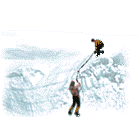
Course Info
|
1999 Dates Prep I: March 20-27 Prep II: April 3-10 Prep III: April 13-20
Climbing Level
Prerequisite
Course location
Climber/Guide
Cost
 Mountaineering -- Freedom of the Hills by Don Graydon Classic climbing course text; solid info on all aspects of mountain, rock and ice climbing. Available in paperback.
Ice World -- Techniques & Experiences Of Modern Ice Climbing
|
| Home | Expeditions | Training Courses | Photo Gallery |
[Mountaineering School Index] [See the Gear List] [Client Comments]
Denali Prep/Winter Mounaineering
 The Denali Prep/Winter Mountaineering course is specifically designed for
those who want to embrace the challenges of climbing Denali and/or develop
extreme winter mountaineering skills. It offers comprehensive training to
prepare for the challenge of "The Great One". Throughout this extremely
rigorous course, we encounter numerous challenges (closely matching those
found on Denali and other similar "big" mountains) in an effort to develop
highly aware, knowledgeable and competent expedition climbers. Hands-on
experience in all aspects of expedition climbing will be covered.
The Denali Prep/Winter Mountaineering course is specifically designed for
those who want to embrace the challenges of climbing Denali and/or develop
extreme winter mountaineering skills. It offers comprehensive training to
prepare for the challenge of "The Great One". Throughout this extremely
rigorous course, we encounter numerous challenges (closely matching those
found on Denali and other similar "big" mountains) in an effort to develop
highly aware, knowledgeable and competent expedition climbers. Hands-on
experience in all aspects of expedition climbing will be covered.
Course Objectives
Note: Early spring conditions often present high avalanche conditions or inclement weather. In such cases, low traverses around the mountain will be undertaken instead of summit attempts. Often the overall experience is enhanced by experiencing and evaluating these conditions, rather than focusing on the summit as a goal.
Course Itinerary
Day 1: 7:00am orientation and gear check. We drive to the mountain and
snowshoe to our first camp. During the course, snowshoe training is
combined with pulling gear sleds. The afternoon will be devoted to snow
camping techniques, including safe camp locations, snow shelters, cooking
and cold-weather health maintenance.
 Day 2: Move camp and snow climbing instruction. We spend the morning
packing and moving camp. This allows us to easily access practice areas,
while honing both packing and camp set-up skills. Students learn the
fundamentals of moving safely and efficiently on snow slopes of all
degrees. Instruction includes: kicking steps, balance and rest techniques,
using the ice axe, self-belay, self-arrest and snow climbing in rope teams.
Day 2: Move camp and snow climbing instruction. We spend the morning
packing and moving camp. This allows us to easily access practice areas,
while honing both packing and camp set-up skills. Students learn the
fundamentals of moving safely and efficiently on snow slopes of all
degrees. Instruction includes: kicking steps, balance and rest techniques,
using the ice axe, self-belay, self-arrest and snow climbing in rope teams.
Day 3: Technical climbing on snow. After moving camp, anchor placements and technical rope climbing instruction for ascending steep snow slopes is given and practiced. Special emphasis is placed on setting and ascending fixed lines. Other instruction includes: belaying, lead climbing, rappelling and descending fixed lines.
Day 4: Glacier travel. Proper rope up techniques using sleds will be taught. Considerable time is spent route finding through crevassed areas and identifying our position on maps. Topics such as travel in white-outs and inclement weather are discussed and practiced.
Day 5: Crevasse rescue. You learn to rescue yourself and others from crevasses. More importantly, you learn how to stay out of them! Instruction includes setting rescue systems and prussiking out of a crevasse with pack and sled.
Day 6: Move to high camp. Weather permitting, we pack camp and move up the glacier to high camp. Discussions include avalanche conditions and safe route-finding. In camp, we prepare for summit day and bed down early.
Day 7: Summit day. Conditions permitting, we attempt a summit climb. This long and demanding day affords the opportunity to apply all of the skills learned during the course
Day 8: Navigation, route-finding and map reading. The group leads the guides out to the trailhead. This is the final skills test and a great introduction to expedition navigation. Upon return, we celebrate completion of the course.
Student Comments
"I can summarize the course in a sentence: It was a fantastic experience,
with excellent leadership backed by a substantial body of mountaineering
knowledge. I would recommend it to anyone who desires an intensive dose of
mountaineering information." —James G.
All Alpine Ascents courses on Mount Baker are run under a
special use permit issued by Mt. Baker-Snoqualmie National Forest.
| Top of Page | Guides & Staff | What's New | Home |
| Burleson's Director Statement | Poisk Oxygen Systems | ||
